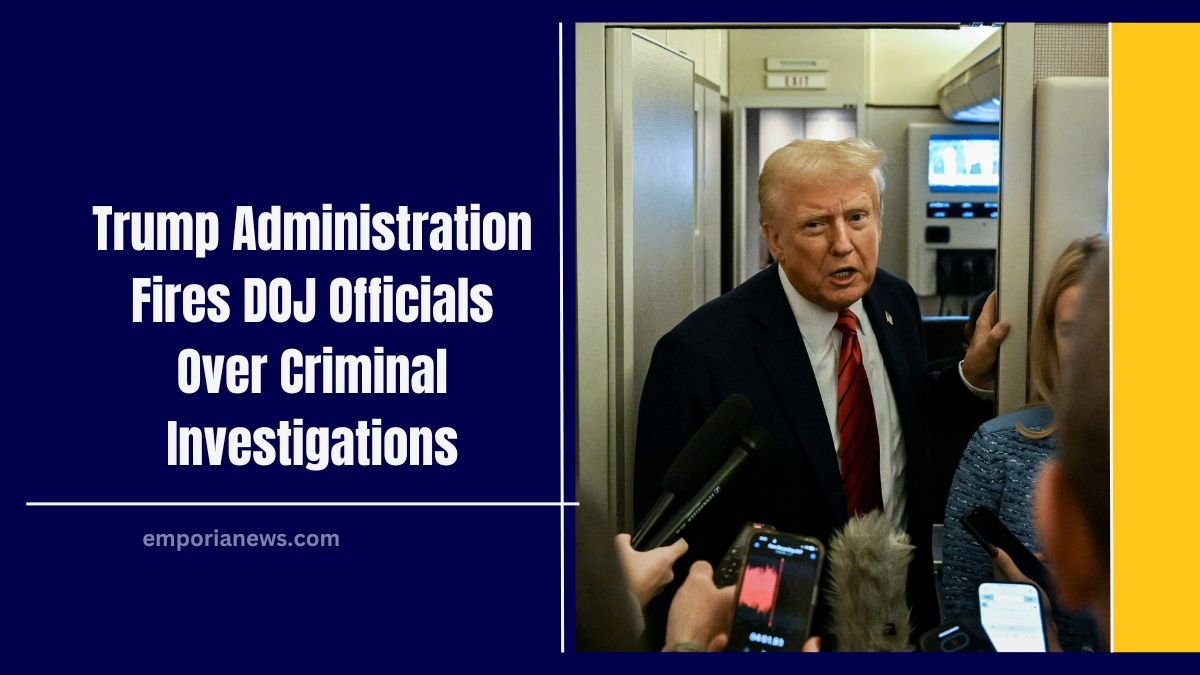In a move that has raised significant legal and political concerns, the Trump administration fired several Department of Justice (DOJ) officials who played key roles in criminal investigations involving former President Donald Trump.
The firings, which came shortly after Trump’s re-election and inauguration, were described as part of an effort to “end the weaponization of the federal government.” Here’s a closer look at the events, their implications, and what lies ahead.
The DOJ Firings: What Happened?
The Justice Department confirmed that several career lawyers, including high-profile prosecutors such as Molly Gaston, J.P. Cooney, Anne McNamara, and Mary Dohrmann, were dismissed.
These officials were instrumental in handling investigations led by former Special Counsel Jack Smith into Trump’s alleged mishandling of classified documents and his efforts to overturn the 2020 election.
Key Details of the Firings
| Aspect | Details |
|---|---|
| Reason for Termination | Participation in investigations against Trump |
| Key Officials Fired | Molly Gaston, J.P. Cooney, Anne McNamara, Mary Dohrmann |
| Action Taken by | Acting Attorney General James McHenry |
| Appeal Process | Employees can appeal to the Merit Systems Protection Board |
| Official Justification | Lack of trust in implementing the president’s agenda |
The Trump administration described these actions as necessary to ensure that the DOJ operates free of political bias, but critics argue this undermines the rule of law and sets a dangerous precedent.
The Context: Investigations and Political Retaliation
Criminal Investigations into Trump
The fired officials were deeply involved in investigations that included:
- Trump’s mishandling of classified documents.
- His alleged role in the January 6, 2021, attack on the U.S. Capitol.
- Efforts to overturn the 2020 election results.
While most of these cases were dismissed after Trump’s re-election, critics contend that the firings amount to political retribution against those who were simply performing their duties.
Executive Order to “End Weaponization”
Immediately after his inauguration, Trump issued an executive order aimed at “ending the weaponization of the federal government.” The order called for the removal of officials believed to have pursued politically motivated investigations.
Reactions to the Firings
Supporters’ Perspective
Trump’s allies argue that the DOJ firings are necessary to restore trust and eliminate perceived bias within federal agencies. They claim the actions align with the administration’s commitment to ending politically motivated investigations.
Critics’ Concerns
Legal experts and former DOJ officials have strongly condemned the firings:
- Rule of Law: Critics, including former U.S. Attorney Joyce Vance, have called the firings “anti-democracy” and “anti-rule of law.”
- Chilling Effect: The dismissals could deter future DOJ employees from pursuing investigations involving public officials.
- Due Process Violations: Federal employment law expert Julie Zebrak emphasized that career civil servants cannot be summarily fired without due process.
Implications for Justice and Accountability
The firings have far-reaching consequences for the Justice Department, rule of law, and the broader political landscape.
1. Undermining DOJ Independence
Removing career prosecutors for their involvement in specific cases raises concerns about the DOJ’s ability to operate independently from political influence.
2. Precedent for Future Administrations
Legal experts warn that such actions could set a dangerous precedent, where administrations retaliate against civil servants for investigating political figures.
3. Civil Service Protections
While the fired officials have the right to appeal, the process could take months, potentially leaving these positions vacant and further disrupting the DOJ’s operations.
Potential Legal and Political Ramifications
The decision to fire DOJ officials involved in Trump’s investigations is already generating significant legal and political fallout:
- Legal Challenges: The dismissed officials may challenge their terminations, arguing that they were improperly fired in retaliation for performing their duties.
- Public Trust: The firings could erode public confidence in the DOJ’s impartiality and independence.
- Congressional Oversight: Lawmakers may launch investigations into whether the firings violated civil service protections or other federal laws.
The firing of DOJ officials involved in criminal investigations against Donald Trump marks a controversial chapter in the Justice Department’s history.
While the Trump administration argues that these actions are necessary to restore impartiality, critics see them as an attack on the rule of law and a chilling reminder of the dangers of political interference in the justice system.
As the affected officials consider legal challenges and lawmakers scrutinize the firings, the broader implications for justice, accountability, and democracy remain a critical concern.
Moving forward, ensuring that the DOJ remains independent and free from political influence will be essential to maintaining public trust and the integrity of the legal system.




